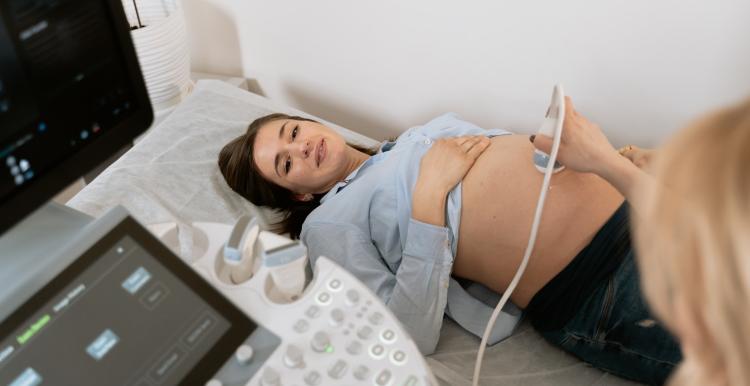I'm pregnant. What care can I expect from the NHS?

Finding out you’re pregnant
You should see your GP or a midwife as soon as you find out you’re pregnant. They will be able to tell you about pregnancy care (also known as antenatal care) and the next steps you need to take.
Your pregnancy will be treated confidentially, even if you’re under 16.
Find your local maternity service
What is antenatal care?
Antenatal care is the care you get during your pregnancy. It is also called pregnancy care or maternity care. Once you have told your GP you’re pregnant, you should be offered appointments with a midwife or sometimes a doctor who specialises in pregnancy and birth.
The midwife or doctor providing your care will:
- Check the health of your baby.
- Give you information about having a healthy pregnancy.
- Discuss your options and choices for care during your pregnancy, labour and birth.
- Ask you how you’re feeling.
- Answer any questions you have.
Mental health and pregnancy
Being pregnant can have a significant impact on your mental health. While it’s an exciting time for many, you might also feel anxious, worried, confused or shocked.
You should speak to your GP:
- If you have a mental health condition and are worried about how it could affect your pregnancy.
- If you’re taking medication for a mental health condition and find out you’re pregnant.
You might also develop a mental health condition during pregnancy or after birth. Your GP or midwife might offer you two types of treatment:
- Talking therapies
- Medication
Partners might also have mixed feelings about becoming a parent. It’s important that partners also seek support for their mental health if they need it.
What antenatal appointments will I have?
In England, the NHS should offer you the following:
- Two pregnancy ultrasound scans at 8 to 14 weeks and 18 to 21 weeks.
- Antenatal screening tests to determine the chance of your baby having certain conditions.
- Blood tests to check for syphilis, HIV and hepatitis B.
- Screening for sickle cell and thalassaemia.
Your GP or midwife should do some of these tests before you’re ten weeks pregnant, so it’s essential to see a midwife or GP as early as possible.
Your midwife will also carry out some checks and tests, such as urine and blood pressure checks, throughout your pregnancy.
How many antenatal appointments will I have?
If you’re expecting your first child, you can have up to 10 appointments.
If you have had a baby, you’ll have around seven appointments. This could change if you develop a medical condition.
What’s your experience of maternity care?
If you are pregnant or have recently had a baby, we want to hear your experience of maternity care, including what support you have had for your mental health.
By sharing your feedback, you can help improve care for other parents like you.
Where will I have my antenatal appointments?
Your appointments can happen at your home, a children’s centre, a GP surgery or a hospital. You’ll usually go to the hospital for any scans.
Your appointments will become more frequent from around 24 weeks. If your pregnancy is uncomplicated, and you and your baby are in good health, this might not be the case.
In your later appointments, your midwife or GP will:
- Check your urine and blood pressure.
- Feel your tummy to check the baby’s position.
- Measure your womb to check your baby’s growth. The measurement will be recorded in your notes.
- Listen to your baby’s heartbeat if you want them to.
What information should I be given during pregnancy?
At later antenatal appointments, you should be given information about the following:
- Preparing for labour and birth, including how to make a birth plan.
- How to tell if you’re in active labour.
- Induction of labour if your baby is overdue
- ‘Baby blues’ and mental health conditions like postnatal depression.
- Feeding your baby.
- Vitamin K (given to prevent vitamin K deficiency in your baby).
- Screening tests for newborn babies.
- Looking after yourself and your new baby.
What questions might I be asked at antenatal appointments?
Your GP or midwife might ask you about the following:
- The date of the first day of your last period.
- Your health.
- Any previous illnesses or operations.
- Any previous pregnancies or miscarriages.
- The ethnic backgrounds of you and your partner to find out whether your baby might be at risk of certain conditions.
- Whether your family has a history of twins.
- Your job, your partner’s job and what kind of housing you live in.
- How you’re feeling and whether you have had a mental health condition in the past.
What should I tell my midwife or GP?
Your antenatal appointments allow you to tell your GP or midwife about any additional support you might need or if you’re in a vulnerable situation.
You can speak to your midwife or GP about the following:
- Your mental health.
- Any special health needs.
- A disability or long-term condition.
- Domestic or sexual abuse.
- Drugs or alcohol misuse.
You should also tell your midwife or GP if you speak English as a second language or if you do not speak English.
Your midwife will also ask you about any social care support you may have or need.
More detailed information
Pregnancy week-by-week
The NHS has a week-by-week breakdown of what to expect from your pregnancy. It includes information about your baby's development and what you should be aware of as your pregnancy proceeds. For example, at 13 weeks, you’ll probably start to feel less sick and tired.
It also includes things to think about each week, like when to have your flu vaccine.
Your antenatal appointments week-by-week
This NHS guidance explains the support you should receive from your midwife or doctor throughout your pregnancy. For example, if this is your first baby, you should have an appointment at 31 weeks.
Pregnancy-related health conditions
During pregnancy, your body goes through enormous changes. As a result, you may experience some common health problems.
However, some people have more severe complications, such as excessive nausea.
You might need specialist advice or care if you have a long-term health condition, such as diabetes or asthma.
You should speak to your GP or midwife if you have any worries. You can also phone NHS 111. In some cases, you might need to seek urgent medical attention. For more information about specific conditions, look at the NHS guidance.
Tommy’s pregnancy hub
Tommy’s is the largest UK charity researching the causes and prevention of pregnancy complications, stillbirth, premature birth, and neonatal death.
They run a midwife-led information hub, which covers everything you need to know about having a safe and healthy pregnancy.
They also offer extra support for Black and Black Mixed Heritage people in the UK. Tommy's set this service up because Black women experience higher risks during pregnancy.
I’m unhappy with my maternity care. What should I do?
NHS services and staff should treat you with dignity and respect. If you are worried about your maternity care, talk to our midwife or doctor as soon as possible. You can also contact the Head or Director of Midwifery. Their details will be on the NHS Trust or Board website.
If you want to make a complaint, you should:
- Make your complaint within 12 months from the time of the treatment you are complaining about.
- Make your complaint to the NHS body responsible for your care.
- Ask to see your healthcare records before you complain.
- Make notes of what happened as soon as possible.
For more detailed advice on how to make a complaint about NHS maternity care and other ways you can provide feedback about your experience, take a look at the Birthrights complaints factsheet.
Where can I get support to make a complaint?
Birthrights is a free and confidential service that helps anyone who needs advice about their rights during pregnancy and childbirth. They can also give you advice on making a complaint. Get in touch via their contact form or email advice@birthrights.org.uk.


